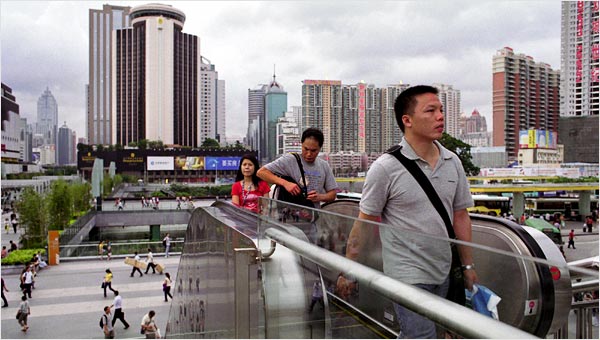
China’s Brain Drain Dilemma: Elite Emigration
Publication: China Brief Volume: 10 Issue: 16
By:

A popular Internet writer recently caused a stir when he asserted that “all Chinese who earn more than 120,000 yuan ($17,650) a year want to immigrate.” While this view is exaggerated, there is no denying the upsurge in Chinese emigration to Western countries—particularly the United States, Canada and Australia—since the mid-2000s. Most worrying for the Chinese Communist Party (CCP) leadership is the fact that despite widespread publicity given to the supposed viability of the “China model,” an increasing amount of China’s elite are choosing to leave the fast-rising quasi-superpower for the West (China News Service, July 16; Asiasentinel.com, July 16).
China became the biggest worldwide contributor of emigrants in 2007. According to the official Chinese media, 65,000 Chinese last year secured immigration or permanent resident status in the United States, 25,000 in Canada and 15,000 in Australia. Chinese are outnumbered by only Mexicans as the largest ethnic group who acquired green cards in the United States in 2009. Particularly in the area of investment-related immigration (see below) to major Western countries, Chinese are tipped to become the largest cohort within the next few years (Xinhua News Agency, June 4; Time-weekly.com [Guangzhou], June 24; Finance.ifeng.com, July 1).
Despite the downturn in Western economies in the wake of the financial crisis, more Chinese students are expected to stay on after getting degrees and professional qualifications. Among the 270,000 Chinese who are going to foreign universities as self-paying students this year, only around 25 percent are projected to return to China upon graduation. Then there are middle-class and affluent Chinese who take advantage of liberalized travel regulations to give birth to children in the United States and other Western countries. It is little wonder that, according to the Overseas Affairs Office of the State Council, there are more than 45 million huaqiao or “overseas Chinese” worldwide (China News Service, July 24; China Youth Daily, July 15; China Daily, July 3; Beijing.neworiental.org, July 20; Apple Daily, July 21).
Emigration to the West started not long after late patriarch Deng Xiaoping inaugurated the era of reform and open door policy in 1978. Deng’s second, son Deng Zhifang, who gained a Ph.D. in physics from Rochester University and subsequently became a wealthy businessman in China, was among the first members of the Chinese elite to settle in the United States. Emigration picked up speed by the mid-1990s even as coastal China became the “world factory.” Prominent among members of this first wave of emigrants are corrupt officials who find it safer to park their ill-gotten gains in Western countries. Their modus operandi is sending spouses and children overseas before slipping away themselves. By the end of 2009, an estimated 4,000 corruption-tainted cadres had gone abroad. Each of them reportedly carried with them illicit fortunes worth at least 100 million yuan ($14.7 million) (Outlook Weekly [Beijing], May 24; Chongqing Morning Post, January 10).
Owing to China’s opaque business and tax laws, most private entrepreneurs deem it prudent to transfer a good part of their fortunes to Western countries. This can be legally—and easily—done through investor immigration schemes. The trend has intensified despite the passage in 2007 of the landmark Property Rights Law, which guarantees the inviolability of private property in the socialist country. A recent investigation by the official Hangzhou Daily noted that around 1,500 businessmen from coastal Zhejiang Province emigrate to the West every year—and the numbers are expected to rise by up to 20 percent annually in the near future. In the past decade, emigrants from Zhejiang, known as a haven for private business, have taken at least 60 billion yuan ($8.82 billion) of assets overseas. Apart from opportunities of developing their businesses in different markets, these “red capitalists” have cited the “hate the rich” mentality in China as an important reason for emigration. Partly owing to the growing gap between the poor and rich, nouveau riche businessmen often become targets of crimes including kidnapping and murder (Hangzhou Daily, June 24; Finance.ifeng.com, June 25; United Daily News [Taiwan] May 23).
Yet the largest group of emigrants consists of professionals and experts with a middle-class background, who, according to well-known immigration consultant Qi Lisun, outnumber entrepreneurs by a large margin. The official Chinese media admit that professionals, and to some extent businessmen, are leaving the country due to dissatisfaction with harrowing contradictions in Chinese politics and society. In other words, as a result of China being a country that does not recognize global norms such as civil and democratic rights, many of its best-trained, most qualified citizens may be “voting with their feet” by settling in the West. Indeed, a commentary in the official Xinhua News Agency last month indicated that many members of China’s elite had chosen to relocate to Western countries “in search for a sense of safety”—a way out of “the pain and aberrations brought about by social transformation” in the past decade or so (Xinhua News Agency, July 12; Tudou.com, July 25; Apple Daily [Hong Kong], July 26). Nie Xiaoyang, vice-chief editor of the popular Globe magazine, said emigrants destined for the United States were not just after a higher standard of living. “A very important point is the tolerance and energy of American society,” Nie said. “Its multifaceted cultural environment can give people more confidence.” A recent article on the China Broadcasting Corporation website noted that the authorities must “boost their respect for talents and furnish them with more humanistic concern” to persuade high caliber personnel to remain in China. The commentary also cited the importance of “a transparent system of regulations and a sense of security” as well as “a fairer environment in which people can develop their talent” (Sina.com, June 29; China National Radio Net, June 29).
Partly to counter the brain drain, the State Council unveiled last month “The Mid-to Long-term National Plan for the Development of Talents,” which spans the years 2010 to 2020. Beijing’s goal is that by the year 2020, “China will have entered into the front ranks of countries with superior human resources.” According to Director of the CCP Organization Department Li Yuanchao, “human resources constitute the core competitiveness in scientific development.” Li, also a Politburo member, pointed out that party-and-state authorities “will not waver in embarking on the road of [turning China into] a country with outstanding talents” (People’s Daily, June 7; Guangzhou Daily, June 7). Earlier, Beijing had in January 2009 launched the so-called “Thousand Talents Program” to lure accomplished Chinese back from overseas. Organization Chief Li claimed recently, “China is going through the third wave of talents returning to the motherland.” Li said that the first wave, which included “Father of the Republic” Dr. Sun Yat-sen and former Premier Zhou Enlai, came back from abroad to overthrow feudalism. The second wave was a reference to scientists such as rocket experts Qian Xuesen and Qian Sanqiang, who left high-paying jobs in the U.S. and Europe in the 1950s. “The third wave is taking place now,” Li said, adding that more foreign-based Chinese than ever are eager to contribute to the modernization enterprise (People’s Daily, July 31; China News Service, May 30).
Statistics, however, do not seem to support Li’s claims. As of May this year, central-government units had only attracted 600-odd high-caliber experts and entrepreneurs under the “Thousand Talents Program.” Moreover, most of these prized haiguipai or “returnees” are businessmen; and many of them have chosen to hang on to their overseas passports and green cards (China News Service, May 30; People’s Daily, May 25). One basic reason behind Beijing’s less-than-successful effort to boost the number of returnees could be that the latter face a glass ceiling in party-and-government units. Without a record of accomplishment in political reliability and service to the CCP, it is difficult for the haiguipai to be given major responsibility (See “CCP Party Apparatchiks Gaining at the Expense of Technocrats, China Brief, December 16, 2009). It is perhaps for this reason that while meeting a group of returnees who have come back under the “Thousand Talents Program,” Vice-President Xi Jinping said Beijing would “fully respect talents, enthusiastically support [their work] and give them free rein in their pursuits.” Xi pledged that haiguipai experts would be “put in key positions” and that “they would be allowed to take part in professional decision-making, and be put in charge of big projects” (Xinhua News Agency, July 29; People’s Daily, July 30).
In a Xinhua News Agency article that ran in July entitled, “The United States is ‘co-opting’ elites from around the world,” author Ran Wei saluted American soft power, particularly the country’s ability to attract gifted personnel from different countries. Apart from the allure of high caliber universities and cutting-edge high-tech firms, Ran cited institutions and systems that “encourage gifted people to achieve breakthroughs. America puts a lot of stress on the rational use of human resources and on retaining outstanding personnel,” Ran wrote. “Much emphasis is put on the free flow of talents and the abolition of restrictions and discrimination” (Xinhua News Agency, July 24; People’s Daily, July 24). It is significant that in its policies regarding retaining talents as well as enticing huaqiao, Chinese authorities appear to have given top priority to hardware such as salaries, promotion prospects and seed money for starting new ventures. Yet until the CCP leadership is willing to pay more attention to software, particularly modernizing and democratizing socio-political institutions, the wave of emigration is expected to continue even as China narrows its gap with the United States in terms of conventional yardsticks such as GDP and military might.




